外研版(2019)高中英语必修第三册 Unit5What an adventure! Using language公开课课件(共38张PPT)
文档属性
| 名称 | 外研版(2019)高中英语必修第三册 Unit5What an adventure! Using language公开课课件(共38张PPT) | 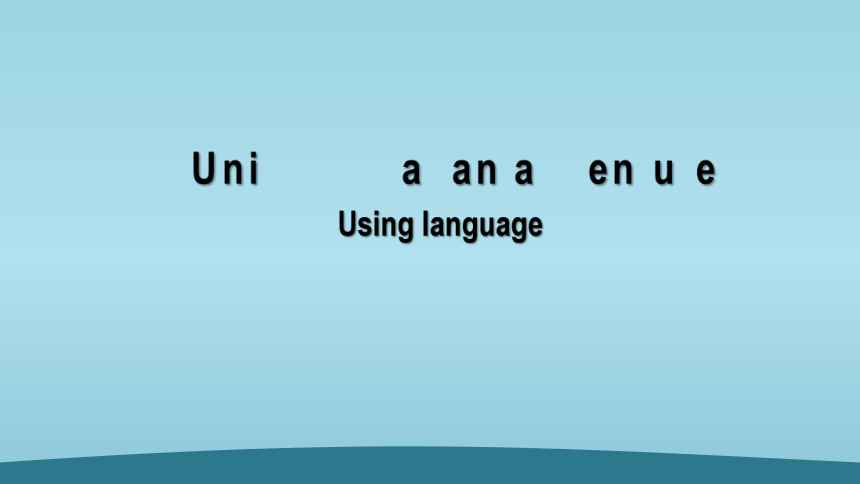 | |
| 格式 | pptx | ||
| 文件大小 | 1.2MB | ||
| 资源类型 | 教案 | ||
| 版本资源 | 外研版(2019) | ||
| 科目 | 英语 | ||
| 更新时间 | 2023-03-01 17:02:19 | ||
图片预览

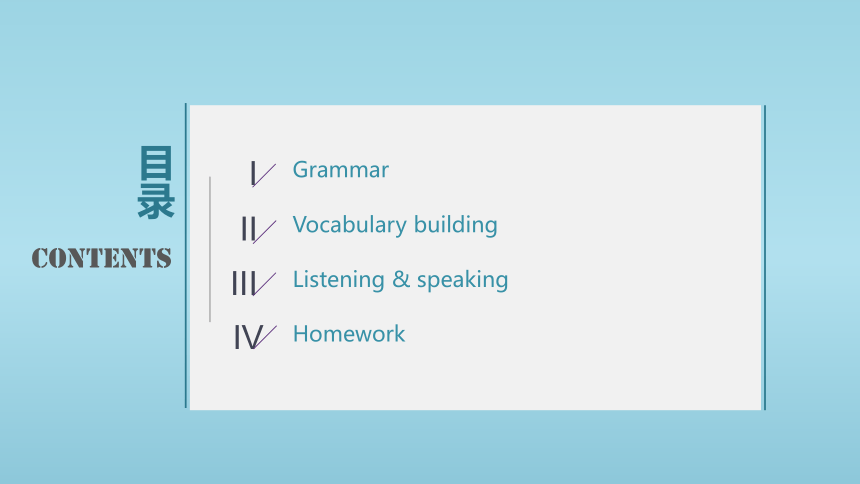
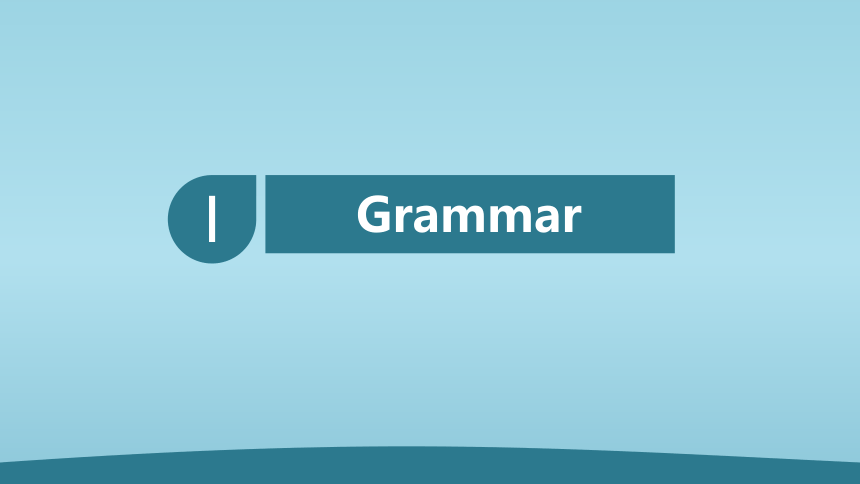
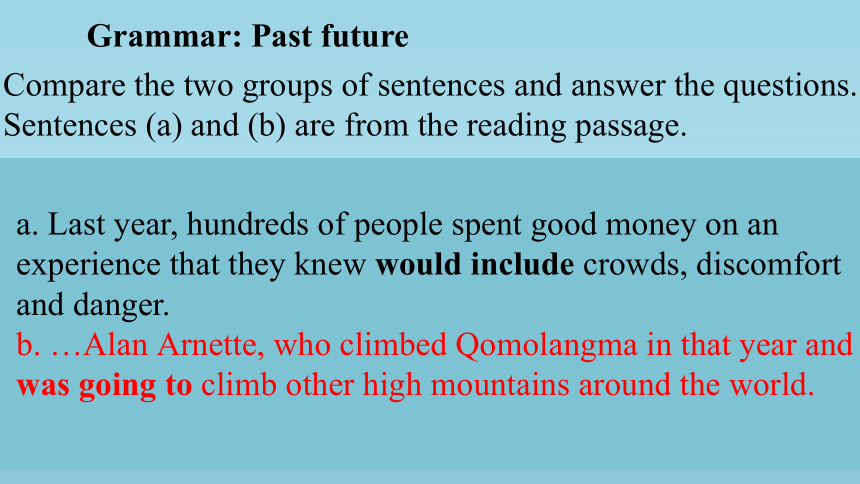
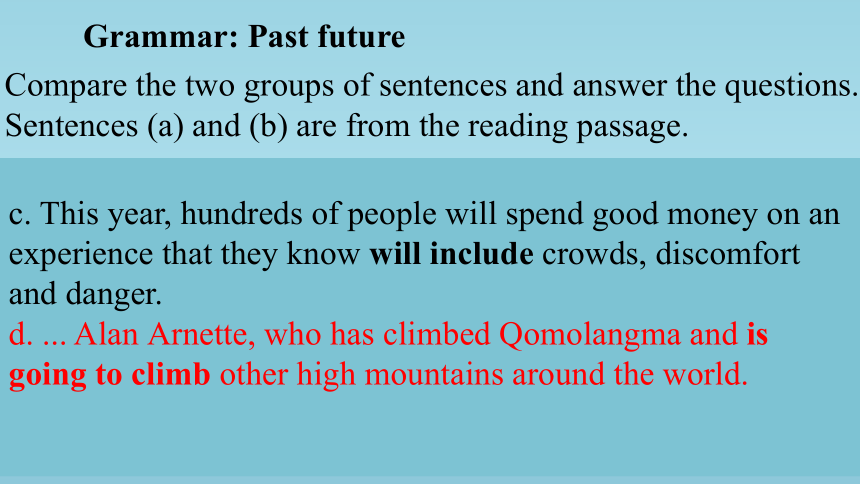
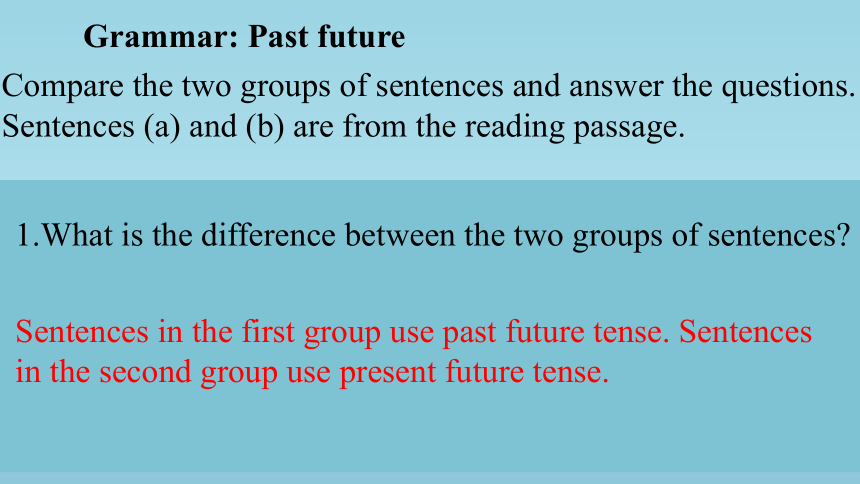
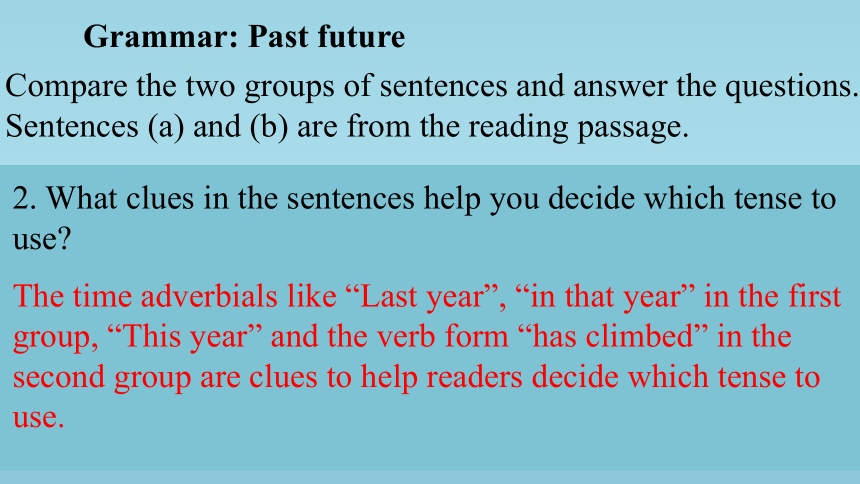
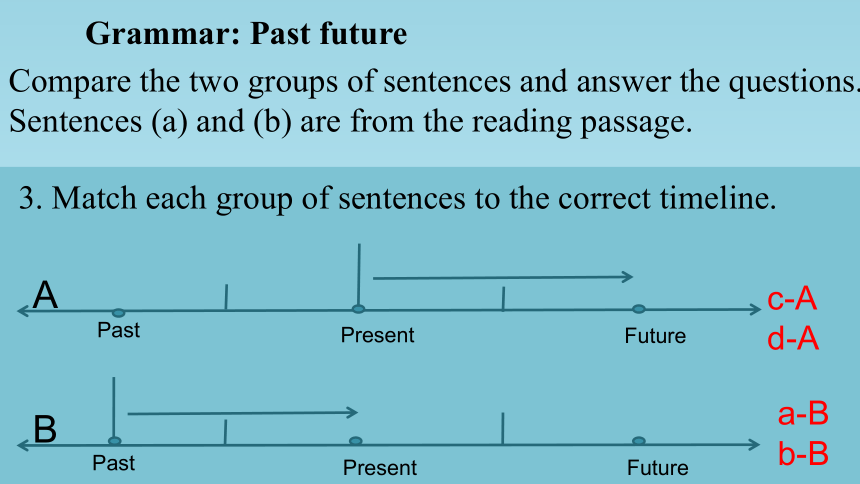
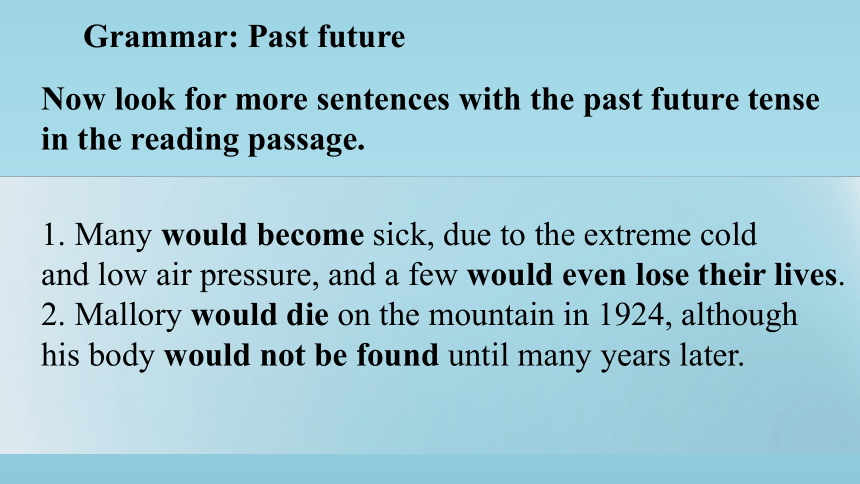
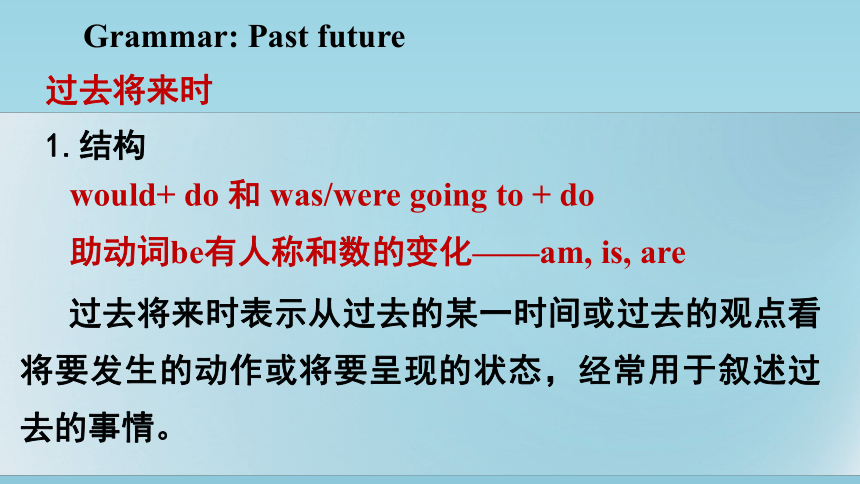
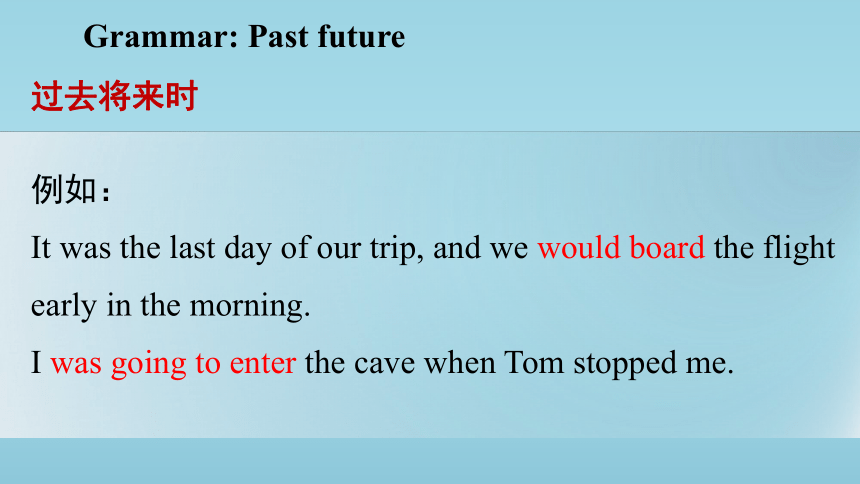
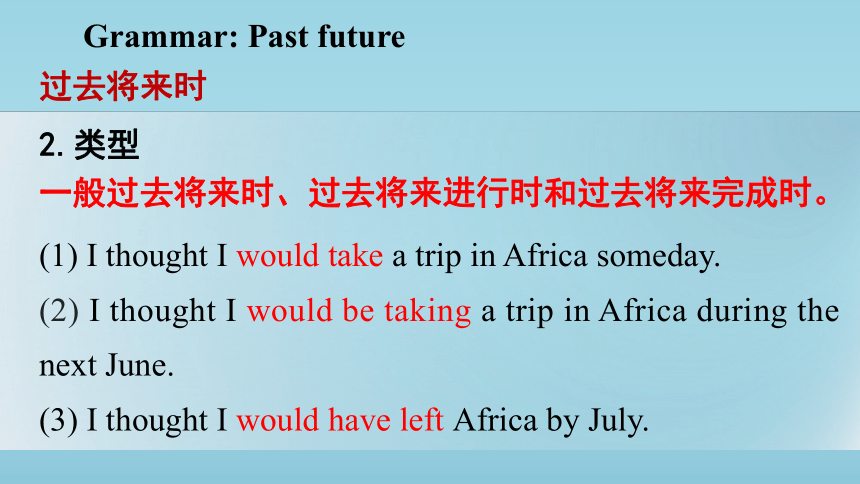
文档简介
(共38张PPT)
Using language
Unit 5 What an adventure!
目录
contents
Grammar
I
IV
Vocabulary building
II
Listening & speaking
III
Homework
I
Grammar
Compare the two groups of sentences and answer the questions. Sentences (a) and (b) are from the reading passage.
a. Last year, hundreds of people spent good money on an experience that they knew would include crowds, discomfort and danger.
b. …Alan Arnette, who climbed Qomolangma in that year and was going to climb other high mountains around the world.
Grammar: Past future
c. This year, hundreds of people will spend good money on an experience that they know will include crowds, discomfort and danger.
d. ... Alan Arnette, who has climbed Qomolangma and is going to climb other high mountains around the world.
Grammar: Past future
Compare the two groups of sentences and answer the questions. Sentences (a) and (b) are from the reading passage.
Grammar: Past future
1.What is the difference between the two groups of sentences
Sentences in the first group use past future tense. Sentences in the second group use present future tense.
Compare the two groups of sentences and answer the questions. Sentences (a) and (b) are from the reading passage.
Grammar: Past future
2. What clues in the sentences help you decide which tense to use
The time adverbials like “Last year”, “in that year” in the first group, “This year” and the verb form “has climbed” in the second group are clues to help readers decide which tense to use.
Compare the two groups of sentences and answer the questions. Sentences (a) and (b) are from the reading passage.
Grammar: Past future
3. Match each group of sentences to the correct timeline.
Compare the two groups of sentences and answer the questions. Sentences (a) and (b) are from the reading passage.
Past
Present
Future
Past
Present
Future
A
B
c-A
d-A
a-B
b-B
Now look for more sentences with the past future tense in the reading passage.
Grammar: Past future
1. Many would become sick, due to the extreme cold
and low air pressure, and a few would even lose their lives.
2. Mallory would die on the mountain in 1924, although his body would not be found until many years later.
would+ do 和 was/were going to + do
助动词be有人称和数的变化——am, is, are
过去将来时
Grammar: Past future
1.结构
过去将来时表示从过去的某一时间或过去的观点看将要发生的动作或将要呈现的状态,经常用于叙述过去的事情。
例如:
It was the last day of our trip, and we would board the flight
early in the morning.
I was going to enter the cave when Tom stopped me.
过去将来时
Grammar: Past future
过去将来时
Grammar: Past future
2.类型
一般过去将来时、过去将来进行时和过去将来完成时。
(1) I thought I would take a trip in Africa someday.
(2) I thought I would be taking a trip in Africa during the next June.
(3) I thought I would have left Africa by July.
过去将来进行时强调在对过去某一时间而言的将来某时刻正在进行的动作或呈现的状态。
过去将来时
Grammar: Past future
3.区别
例如: I thought I would be taking a trip in Africa during the next June.
过去将来完成时则强调在过去将来某一时间以前已经完成的动作或呈现的状态。
过去将来时
Grammar: Past future
3.区别
例如 : I thought I would have left Africa by July.
Write the clauses in the correct order.
a. which/ for three full days/ the storm/would last
_________________________________________
b. remain/where/we would/for many months to come
_________________________________________
c. wouldn’t/for a very long time/be back/we
_________________________________________
d. from port/we/sailing/were
_________________________________________
Grammar: Past future
the storm which would last for three full days
where we would remain for many months to come
we wouldn’t be back for a very long time
we were sailing from port
a. the storm which would last for three full days
b. where we would remain for many months to come
c. we wouldn’t be back for a very long time
d. we were sailing from port
Now complete the captain’s memoir with the clauses.
It was spring, and 1_______. We were excited — none of us knew that these would be our final days together. At first, the sea was calm and we spent our days working, fishing and playing cards, happily unaware that 2______. At that point, 3_____was just a few dark clouds on the horizon. Hours later, the waves rose up over our ship, breaking it into two and throwing us overboard. Our only hope of survival was to swim to the nearest island, 4______.
d
c
a
b
Imagine you were one of the sailors in Activity 2.
Answer the captain’s questions using I was going to ..., but...
Grammar: Past future
Did you hunt for food
Did you collect any water
Did you put up the tent
Did you build a fire
I was going to hunt for food, but my knee was wounded.
Imagine you were one of the sailors in Activity 2.
Answer the captain’s questions using I was going to ..., but...
Grammar: Past future
Did you hunt for food
Did you collect any water
Did you put up the tent
Did you build a fire
I was going to collect some water, but I found there was a hole in the side of the bucket.
Imagine you were one of the sailors in Activity 2.
Answer the captain’s questions using I was going to ..., but...
Grammar: Past future
Did you hunt for food
Did you collect any water
Did you put up the tent
Did you build a fire
I was going to put up the tent, but I found I hadn’t got a hammer and nails.
Imagine you were one of the sailors in Activity 2.
Answer the captain’s questions using I was going to ..., but...
Grammar: Past future
Did you hunt for food
Did you collect any water
Did you put up the tent
Did you build a fire
I was going to build a fire, but suddenly it started to rain.
II
Vocabulary building
Vocabulary building: First aid
Look at the items in the first aid kit and talk about what they are used for.
Vocabulary building: First aid
Look at the items in the first aid kit and talk about what they are used for. And anything else that you think would be useful.
first aid kit
alcohol
ice pack
bandage
plasters
painkillers
scissors
thermometer
rubber gloves
cotton wool balls
Complete the first aid guidelines with the words and expressions in Activity 4.
Vocabulary building: First aid
Broken arm
To reduce the pain, place a(n) 1________on the arm. If it is too cold, cover it with cloth beforehand. It is important to keep the arm still, so make a sling out of a(n) 2______.
ice pack
bandage
Complete the first aid guidelines with the words and expressions in Activity 4.
Vocabulary building: First aid
Cut
Put pressure on the cut with a clean cloth. Once the bleeding has stopped, clean the area out with fresh water or 3_____________ . Once the wound is cleaned and dry, cover it with a bandage.
cotton wool balls
Complete the first aid guidelines with the words and expressions in Activity 4.
Vocabulary building: First aid
Heatstroke
Take the person to a cool place and give him/her lots of water to drink. Take the person’s temperature by putting a(n) 4 __________ under his/her tongue. If it is 40 ℃ or higher, take the person to hospital as soon as possible.
thermometer
Complete the first aid guidelines with the words and expressions in Activity 4.
Vocabulary building: First aid
Insect bite
Wash the area with liquid medicine. If the bite becomes hot, red and itchy, try to cool it down. If the bite is painful, give the person one or two 5 _________. Go to hospital if necessary.
painkillers
Work in pairs. Offer first aid advice for injuries or illness in Activity 5. Add any more you can think of.
Vocabulary building: First aid
You may start like this:
A: Are you OK What’s the matter
B: I think I’ve broken my arm. What should I do
III
Listening & speaking
Listening & speaking: Before listening
China’s National Highway 318, stretching over 5,000 kilometres, runs from Shanghai to Zhangmu, Tibet. It is the longest highway in China. Although regarded as the most dangerous road in the country, it is also known as the “heavenly road” for its amazing views.
Did You Know
Listening & speaking: While-listening
Listen to the interview and choose the words that best describe the speakers’ experiences.
1. Expensive but fun.
2. Difficult and unpleasant.
3. Challenging but rewarding.
Listening & speaking: While-listening
Listen again and complete the blog.
When we came back, we were asked a lot of questions about our adventure. Here we’ll try to answer the most frequently asked questions.
What did you do it
We did it to 1________________________________.
How did you prepare
We really practised a lot! If we weren’t studying, we were 2_______.
raise money for a children’s charity
cycling
Listening & speaking: While-listening
Listen again and complete the blog.
When we came back, we were asked a lot of questions about our adventure. Here we’ll try to answer the most frequently asked questions.
What difficulties did you encounter
We had to 3__________________ day after day. We also had to face 4_______________ and dangerous falling rocks. 5__________ started from Chengdu, but three friends got injured.
cycle up mountains
snowy weather
Five of us
Listening & speaking: While-listening
Listen again and complete the blog.
When we came back, we were asked a lot of questions about our adventure. Here we’ll try to answer the most frequently asked questions.
What did you see
The views were fantastic! The most impressive ones were those of 6___________________.
How did you feel after the trip
It was the best feeling in the world! We had an adventure, raised some money and 7_______________________ to some children’s lives.
the snowy mountains
helped make a difference
Listening & speaking: Post-listening
Now talk about how the speakers describe their experiences. Listen again if necessary.
Useful Expressions:
What did you do it
We did it to…
How did you feel…
It was …in the world!
Listening & speaking: Pair work
Work in pairs. Act out the conversation to talk about the road trips across China. Student A: Turn to Page 83.
Student B: Turn to Page 86.
IV
Homework
Homework
1. Summarize the usage of past future;
2. Think about a trip you have taken and have a similar conversation.
Using language
Unit 5 What an adventure!
目录
contents
Grammar
I
IV
Vocabulary building
II
Listening & speaking
III
Homework
I
Grammar
Compare the two groups of sentences and answer the questions. Sentences (a) and (b) are from the reading passage.
a. Last year, hundreds of people spent good money on an experience that they knew would include crowds, discomfort and danger.
b. …Alan Arnette, who climbed Qomolangma in that year and was going to climb other high mountains around the world.
Grammar: Past future
c. This year, hundreds of people will spend good money on an experience that they know will include crowds, discomfort and danger.
d. ... Alan Arnette, who has climbed Qomolangma and is going to climb other high mountains around the world.
Grammar: Past future
Compare the two groups of sentences and answer the questions. Sentences (a) and (b) are from the reading passage.
Grammar: Past future
1.What is the difference between the two groups of sentences
Sentences in the first group use past future tense. Sentences in the second group use present future tense.
Compare the two groups of sentences and answer the questions. Sentences (a) and (b) are from the reading passage.
Grammar: Past future
2. What clues in the sentences help you decide which tense to use
The time adverbials like “Last year”, “in that year” in the first group, “This year” and the verb form “has climbed” in the second group are clues to help readers decide which tense to use.
Compare the two groups of sentences and answer the questions. Sentences (a) and (b) are from the reading passage.
Grammar: Past future
3. Match each group of sentences to the correct timeline.
Compare the two groups of sentences and answer the questions. Sentences (a) and (b) are from the reading passage.
Past
Present
Future
Past
Present
Future
A
B
c-A
d-A
a-B
b-B
Now look for more sentences with the past future tense in the reading passage.
Grammar: Past future
1. Many would become sick, due to the extreme cold
and low air pressure, and a few would even lose their lives.
2. Mallory would die on the mountain in 1924, although his body would not be found until many years later.
would+ do 和 was/were going to + do
助动词be有人称和数的变化——am, is, are
过去将来时
Grammar: Past future
1.结构
过去将来时表示从过去的某一时间或过去的观点看将要发生的动作或将要呈现的状态,经常用于叙述过去的事情。
例如:
It was the last day of our trip, and we would board the flight
early in the morning.
I was going to enter the cave when Tom stopped me.
过去将来时
Grammar: Past future
过去将来时
Grammar: Past future
2.类型
一般过去将来时、过去将来进行时和过去将来完成时。
(1) I thought I would take a trip in Africa someday.
(2) I thought I would be taking a trip in Africa during the next June.
(3) I thought I would have left Africa by July.
过去将来进行时强调在对过去某一时间而言的将来某时刻正在进行的动作或呈现的状态。
过去将来时
Grammar: Past future
3.区别
例如: I thought I would be taking a trip in Africa during the next June.
过去将来完成时则强调在过去将来某一时间以前已经完成的动作或呈现的状态。
过去将来时
Grammar: Past future
3.区别
例如 : I thought I would have left Africa by July.
Write the clauses in the correct order.
a. which/ for three full days/ the storm/would last
_________________________________________
b. remain/where/we would/for many months to come
_________________________________________
c. wouldn’t/for a very long time/be back/we
_________________________________________
d. from port/we/sailing/were
_________________________________________
Grammar: Past future
the storm which would last for three full days
where we would remain for many months to come
we wouldn’t be back for a very long time
we were sailing from port
a. the storm which would last for three full days
b. where we would remain for many months to come
c. we wouldn’t be back for a very long time
d. we were sailing from port
Now complete the captain’s memoir with the clauses.
It was spring, and 1_______. We were excited — none of us knew that these would be our final days together. At first, the sea was calm and we spent our days working, fishing and playing cards, happily unaware that 2______. At that point, 3_____was just a few dark clouds on the horizon. Hours later, the waves rose up over our ship, breaking it into two and throwing us overboard. Our only hope of survival was to swim to the nearest island, 4______.
d
c
a
b
Imagine you were one of the sailors in Activity 2.
Answer the captain’s questions using I was going to ..., but...
Grammar: Past future
Did you hunt for food
Did you collect any water
Did you put up the tent
Did you build a fire
I was going to hunt for food, but my knee was wounded.
Imagine you were one of the sailors in Activity 2.
Answer the captain’s questions using I was going to ..., but...
Grammar: Past future
Did you hunt for food
Did you collect any water
Did you put up the tent
Did you build a fire
I was going to collect some water, but I found there was a hole in the side of the bucket.
Imagine you were one of the sailors in Activity 2.
Answer the captain’s questions using I was going to ..., but...
Grammar: Past future
Did you hunt for food
Did you collect any water
Did you put up the tent
Did you build a fire
I was going to put up the tent, but I found I hadn’t got a hammer and nails.
Imagine you were one of the sailors in Activity 2.
Answer the captain’s questions using I was going to ..., but...
Grammar: Past future
Did you hunt for food
Did you collect any water
Did you put up the tent
Did you build a fire
I was going to build a fire, but suddenly it started to rain.
II
Vocabulary building
Vocabulary building: First aid
Look at the items in the first aid kit and talk about what they are used for.
Vocabulary building: First aid
Look at the items in the first aid kit and talk about what they are used for. And anything else that you think would be useful.
first aid kit
alcohol
ice pack
bandage
plasters
painkillers
scissors
thermometer
rubber gloves
cotton wool balls
Complete the first aid guidelines with the words and expressions in Activity 4.
Vocabulary building: First aid
Broken arm
To reduce the pain, place a(n) 1________on the arm. If it is too cold, cover it with cloth beforehand. It is important to keep the arm still, so make a sling out of a(n) 2______.
ice pack
bandage
Complete the first aid guidelines with the words and expressions in Activity 4.
Vocabulary building: First aid
Cut
Put pressure on the cut with a clean cloth. Once the bleeding has stopped, clean the area out with fresh water or 3_____________ . Once the wound is cleaned and dry, cover it with a bandage.
cotton wool balls
Complete the first aid guidelines with the words and expressions in Activity 4.
Vocabulary building: First aid
Heatstroke
Take the person to a cool place and give him/her lots of water to drink. Take the person’s temperature by putting a(n) 4 __________ under his/her tongue. If it is 40 ℃ or higher, take the person to hospital as soon as possible.
thermometer
Complete the first aid guidelines with the words and expressions in Activity 4.
Vocabulary building: First aid
Insect bite
Wash the area with liquid medicine. If the bite becomes hot, red and itchy, try to cool it down. If the bite is painful, give the person one or two 5 _________. Go to hospital if necessary.
painkillers
Work in pairs. Offer first aid advice for injuries or illness in Activity 5. Add any more you can think of.
Vocabulary building: First aid
You may start like this:
A: Are you OK What’s the matter
B: I think I’ve broken my arm. What should I do
III
Listening & speaking
Listening & speaking: Before listening
China’s National Highway 318, stretching over 5,000 kilometres, runs from Shanghai to Zhangmu, Tibet. It is the longest highway in China. Although regarded as the most dangerous road in the country, it is also known as the “heavenly road” for its amazing views.
Did You Know
Listening & speaking: While-listening
Listen to the interview and choose the words that best describe the speakers’ experiences.
1. Expensive but fun.
2. Difficult and unpleasant.
3. Challenging but rewarding.
Listening & speaking: While-listening
Listen again and complete the blog.
When we came back, we were asked a lot of questions about our adventure. Here we’ll try to answer the most frequently asked questions.
What did you do it
We did it to 1________________________________.
How did you prepare
We really practised a lot! If we weren’t studying, we were 2_______.
raise money for a children’s charity
cycling
Listening & speaking: While-listening
Listen again and complete the blog.
When we came back, we were asked a lot of questions about our adventure. Here we’ll try to answer the most frequently asked questions.
What difficulties did you encounter
We had to 3__________________ day after day. We also had to face 4_______________ and dangerous falling rocks. 5__________ started from Chengdu, but three friends got injured.
cycle up mountains
snowy weather
Five of us
Listening & speaking: While-listening
Listen again and complete the blog.
When we came back, we were asked a lot of questions about our adventure. Here we’ll try to answer the most frequently asked questions.
What did you see
The views were fantastic! The most impressive ones were those of 6___________________.
How did you feel after the trip
It was the best feeling in the world! We had an adventure, raised some money and 7_______________________ to some children’s lives.
the snowy mountains
helped make a difference
Listening & speaking: Post-listening
Now talk about how the speakers describe their experiences. Listen again if necessary.
Useful Expressions:
What did you do it
We did it to…
How did you feel…
It was …in the world!
Listening & speaking: Pair work
Work in pairs. Act out the conversation to talk about the road trips across China. Student A: Turn to Page 83.
Student B: Turn to Page 86.
IV
Homework
Homework
1. Summarize the usage of past future;
2. Think about a trip you have taken and have a similar conversation.
